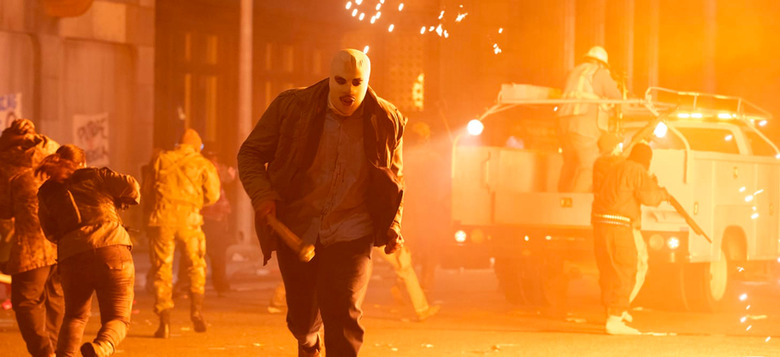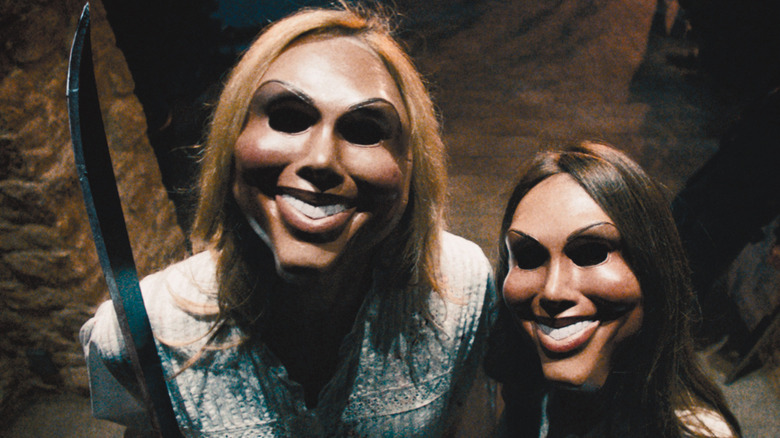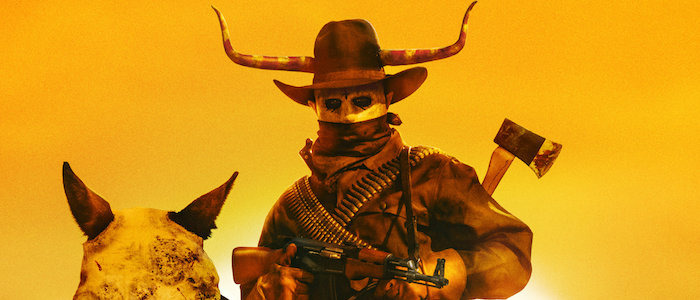'The Forever Purge' Ending Explained: Let's Break Down The Grand "Finale"
This weekend, The Forever Purge blazed a bloody path to a theater near you. Just like the films that came before it, this installment of the Purge franchise is pure bloody chaos that ends with America up in flames. Except this time, the Purge sirens are no saving grace — crime continues to run rampant, with the country still ablaze. That's right, The Purge really is forever.
It was a lot to take in, but we're here to break down the ending and figure out what this means for the future of The Purge universe. Beware, spoilers lie ahead.
The Forever Purge Ending Explained
Despite being outlawed in a previous film, The Purge is reinstated just in time for the fifth movie to kick off. This is quite unfortunate for recent immigrants Adela (Ana de la Reguera) and Juan (Tenoch Huerta), who fled Mexico to escape a drug cartel and achieve the American dream. Now that the New Founding Fathers (NFF) have reclaimed power, The Purge is back with its original rules, offering 12 hours of legal criminal activity to "help a divided America." The carnage and slaughter goes as usual, but we quickly learn that bloodlust isn't always so neatly restrained — 12 hours is no longer enough.
Adela and Juan spend the rest of the film searching for safety alongside an unlikely crew: the family of Juan's employer, Caleb Tucker (Will Patton). Unfortunately, this includes Caleb's son Dylan (Josh Lucas), who resents the migrants working on the ranch, and is a staunch believer that everyone should just "keep to their own." In case it's not made abundantly obvious by the many conversations that circle Dylan's racism and their deadly circumstances, The Forever Purge is all about working with your fellow American, rich, poor, immigrant, or prejudiced.
To hammer in its point, the film presents its characters with a solution to the never-ending wave of crime: escape to Mexico. When it becomes clear that violence in America can not be contained, with even armed forces struggling against the Purge Purification Force, Canada and Mexico open their borders to unarmed Americans seeking to escape the violence. In an interview with IGN, writer James DeMonaco discussed the meaning behind this ending.
"The love story was at the heart of everything. I wanted to follow this cyclical journey of these people coming from Mexico and seeking the American dream in an America that was dying. And then returning home. We flipped everything on its head and Mexico becomes the safe haven. And people are now going that way, and everything is turned upside-down."
Together, Adela and Juan follow the rose signs left by other migrants and discover a hidden safe house run by a nearby Native American tribe. Tribal leader Chiago (Gregory Zaragoza), first seen denouncing The Purge on television, escorts everyone across the border just as the Purge Purification Force catches up with them. Juan, Adela, and Dylan stay back to fight the remaining purgers before following their families across the border. There, Dylan's wife has just had their baby, the universal movie symbol that life will find a way.
In the end, Mexico does indeed become a safe haven, as we zoom out to see the U.S. in flames. As Purgers continue their destruction, the country devolves into an all-out civil war as people begin fighting back. The NFFA is blamed and presumably disbanded, but if we've learned anything from the past five movies, The Purge always finds a way to persist.
The Legacy of The Purge
While the execution of these films has been pretty hit or miss, most agree that the initial concept is a thrill: for one night every year, all crime is legal. With each additional film in the franchise, the Purge movies have leaned further into their social commentary, but make no mistake — The Purge has always been political.The first Purge movie takes place in the wake of an economic collapse and sees a totalitarian government overtake America, instating radical policies to maintain "order." The Purge: Election Year provided a direct response to the 2016 election, while the series prequel, The First Purge, examined government willingness to have Staten Island's Black residents murdered in a Purge test-run. The Forever Purge continues the trend, using The Purge to reckon with the American Dream. As usual, it pulls elements from real life, with the movie magic of embellishment. But ultimately, the power of The Purge is that it's never that far off from reality. Minus the actual purge night itself, the riots, the rise of white supremacy, and the spread of misinformation feel more than familiar. These only get so much focus in the movie itself, of course (the filmmakers wouldn't want to steal time away from our precious jump scares or car explosions). But should the franchise continue, there's so much more to pull from our current reality, and no telling how The Purge will put it to use. Socially distanced Purge night, anyone?
Is This the End of the Purge Franchise?
Though The Forever Purge was once billed as the final installment in the franchise, in a recent /Film interview, producer Jason Blum admitted he isn't ready to let these movies go. Blum said,
"James [DeMonaco] has said, "This is the last movie." I'm going to try and talk him into another movie. I think the franchise has been a great comment on the hollowness of the American Dream. The American Dream is great for a very small handful of people, but there's really a lot of untruth in the American Dream. I think each Purge has touched on that."
So it turns out The Forever Purge was a very fitting title — because The Purge franchise may just go on forever.



